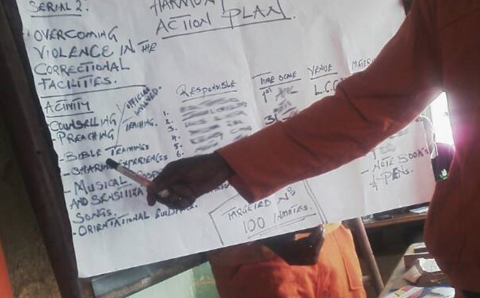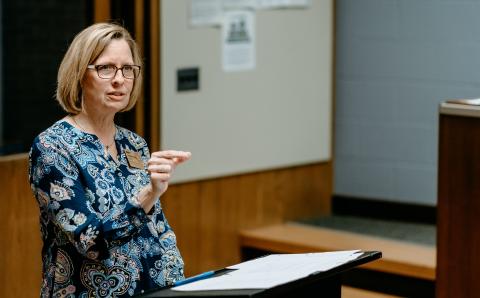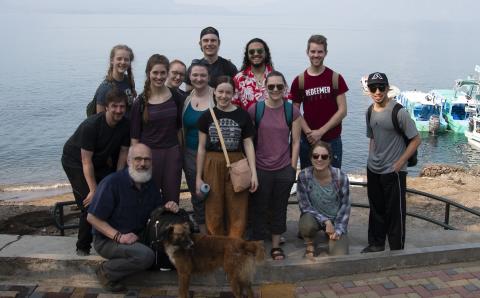Fear and conflict—and fear of conflict—dominate many of the headlines on our news feeds these days. These conflicts (and conflict avoidance) are ripping apart our nations, denominations, congregations, and even our families. According to a study by the Francis A. Schaeffer Institute of Church Leadership, “The top reasons why people leave a church have to do with not being connected in the church and/or being revolted by gossip and turned away by conflict and strife.” Not being connected. Being revolted. These responses are likely the result of our refusal to engage the many conflicts separating us, or our tendency to engage them badly. We’re tired of it—really tired of it. So how can we do better?
Given the formative power of the media we consume almost constantly, it’s no wonder we lack the theological imagination to engage each other constructively. We lack the tools and know-how to welcome conflict precisely as the place where discipleship and ministry meet.
In her study on “Preaching about Controversial Justice Issues,” which surveyed over 1,200 pastors, Leah Schade, a professor at Lexington Theological Seminary, concluded that the main reasons pastors hesitate to address issues of public concern include fear of hurting or dividing their congregation; fear of risking their ability to effectively minister in their church; fear of receiving negative pushback for being “too political”; and fear of loss—loss of members, loss of money, and loss of their own jobs.
No surprises there. Common sense, even, to let sleeping dogs lie.
So how is that working? By 2050, if current trends continue, according to the Pinetops Foundation, 30 million people will have left the church forever.
Fortunately, the church has been given something more interesting than common sense. We’ve been given, in Paul’s words, “the ministry of reconciliation” (2 Cor. 5:18). In a culture drowning in conflict, there is simply nothing more beautiful, needful, or relevant than the reconciling power of the gospel and a people willing to live in light of it. What if, instead of mimicking the fear, confusion, and vitriol so prevalent in our culture, we welcomed conflict as the place to discover how in Christ, for whom and through whom all things were created, “all things hold together” (Col. 1:17)? What if, by eagerly exploring how in Christ, in the church, and in our practices of worship and confession, we’ve already been given everything we need to be faithful?
Yet as disciples, we face a unique challenge. Spiritual practices are meant to shape us and our desires into a particular form—into the image of Christ, of what it means to be truly human. But in our postmodern age, when claims to “truth” can only be understood as assertions of power, how do we articulate a meaningful vision of what is truly human that doesn’t automatically violate one’s personal authenticity?
If Christ has broken down the dividing wall of hostility (Eph. 2:14) between heaven and earth, between Jew and Gentile, surely he has overcome the wall between left and right. Do we not have before us the possibility of witnessing to something the wider culture can no longer imagine—hope that all things do hold together in Christ? Can we imagine it? More importantly, can we embody it for the world to see? Perhaps not without practice.
As director of The Colossian Forum, I have had the opportunity to practice with churches all over the country how these gospel possibilities can be lived out on the ground. By leaning into conflict as an act of worship, we have seen the embodied truth of Colossians 1:17 lived out in powerful, undeniable ways. We have seen the Holy Spirit create new possibilities, new relationships, and new ways forward.
When we practice “the Colossian way” faithfully, intentionally, and over time, God shows up. Repeatedly. Reliably. Or we become aware of the fact that God has been there all along. We discover God in the most unexpected places—in the faces and hearts of people we disagree with. Perhaps even in those we have called our enemies. When we make ourselves vulnerable by loving God and our neighbor, who may also be our enemy, God does new things right before our eyes.
Because I can’t readily explain it, I find myself reaching for the words of the Christian tradition—our confessions and doctrines and beliefs—not to shove them down the throat of my opponent, but rather to make sense of the encounter with the true and living God in the face of the other.
The “beauty” of conflict, especially conflict around complex issues like sexuality, climate change, political ideology, or even hermeneutics is that we’re not going to solve them any time soon. Why is this beautiful? Because it forces us to acknowledge that the primary problem underlying our brokenness and fragmentation isn’t just a lack of information but a lack of formation. We’re not yet the kind of people we need to be to live together well. Thankfully, formation into the image of Christ is exactly what the church and its worship are all about.
In the midst of all the conflict and fear, we feel our need. Perhaps we might just be desperate enough to put ourselves at God’s mercy, engaging conflict not as people “in the right” who absolutely must “win,” but through explicitly Christian practices of self-giving love and reconciliation. Taking up the ministry of reconciliation has the potential to show Jesus to a world that so desperately needs to see him.
What might such formation practices look like?
First, we must engage conflict itself as an act of worship. This means that as we engage our differences, we must do so with a shared acknowledgement that we are doing it in God’s presence and for God’s glory. We must ask ourselves and our brothers and sisters on the opposite side of the issues whether our exchange glorified God. If not, how must we together lament? Confess? Repent?
Second, we must give up our desperate desire to win at all costs and testify instead that Christ has already won. Thus we’re uniquely free, as followers of Christ, to love each other as Christ loved us. Does this mean we’ve given up on the truth? By no means! Instead, because Christ has already won, we can give up our need to win the argument as a way of displaying that victory. Instead, as image-bearers of the God who laid down his life for us, we can show how the truths of the faith we hold so dear actually make possible a way of being that the world can no longer imagine.
To practice engaging conflict as followers of Christ gives us the perfect opportunity to lay down, if not our lives, at least our arguments for those “others” God has so graciously given us for our own sanctification. Through that sanctification, perhaps we’ll come to see that person we so vehemently disagree with as the very face of God, and learn that difference, desire, and delight were meant to hang together—just like Father, Son, and Holy Spirit.
Discussion Questions
- Talk about a time you experienced conflict. Did reconciliation or resolution take place?
- How does engaging conflict as “an act of worship” change your perceptions of conflict?
- What are ways we can begin to let go of the “winning” mentality and embrace a reconciliation mentality when engaging conflict? What steps can we take?
- Recognizing that the primary problem isn’t just “a lack of information but a lack of formation,” how can we move toward being the “kind of people we need to be to live together well”?
About the Author
Michael Gulker is president of The Colossian Forum, sharing the good news that conflict need not be a threat. He attends Calvary Christian Reformed Church in Wyoming, Mich.








